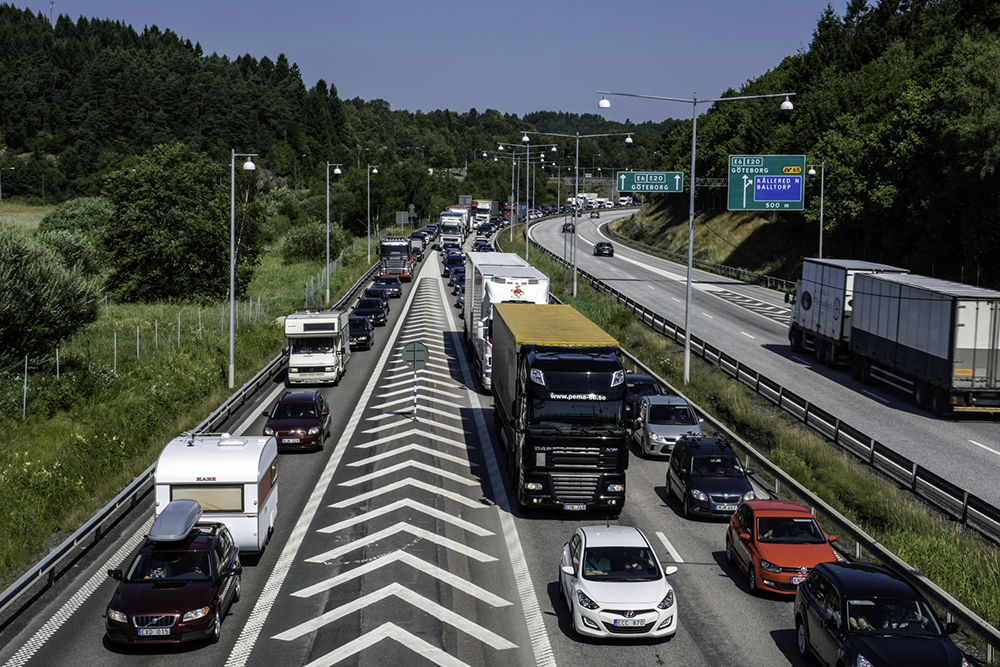Six routes for the future of car transport

Introducing electric cars and biofuels is not enough. Passenger car traffic must be reduced by at least 20 per cent if Sweden is to meet its climate targets. This is according to a study by environmental researchers at KTH Royal Institute of Technology.
In the study, the researchers present six scenarios for the future of car traffic in Sweden. The starting point is that emissions will be reduced by 70 per cent by 2030, according to current climate targets for domestic transport. Uncertainty relates mainly to how much electric car traffic will increase and to what extent biofuels will be used.
The study is the first to analyse the effects of greatly increased production of electric cars for Swedish conditions and study in depth the importance of biofuel availability.

The conclusion is that even if there will be a high proportion of electric cars and biofuel use, a reduction in car travel will be required, says Mattias Höjer , professor of Strategic Sustainability Studies at KTH and one of the researchers behind the study.
At the current rate of sales of electric cars, the researchers estimate that passenger car traffic will still need to be reduced by 20-25 per cent.
Shortage of bioenergy
“It is possible that Sweden can get away with smaller reductions if we seize a relatively large share of the world's biofuels, and electrification proceeds very quickly at the same time,” says Höjer, warning of the shortage of bioenergy:
“If countries like Sweden lay hold of a disproportionate share of biofuels, it makes it more difficult for other countries to reach their targets. Since it is the global greenhouse gas emissions that matter, we do not gain much by reaching the targets with solutions that are not globally sustainable.”
He says the same reasoning can be applied to using electric cars. “There is not much to be gained from electrification if the resources are only enough for Sweden.
The resources for producing batteries are limited, and the production of electric cars leads to increased emissions.
Traffic in big cities
“This limits the possibility of solving the problem of completely replacing all fossil fuel cars with electric cars. However, one way to reduce the struggle for battery resources is to focus on smaller electric cars instead of large ones.
If the number of cars is to be reduced, who should still have access to one?
“With a little more time to plan, traffic in and around major cities can primarily be reduced because public transport is available and distances are shorter.”
In a recent opinion piece you address this topic directly to the Swedish government. Whhat are the current political possibilities for realising your proposals?
“The government has so far shown little interest in the climate issue, but when they start to do so, we expect this type of calculation to be very useful. There is quite a lot of scope for designing various policies based on the results.”
Recently, John Hassler, a professor in macroeconomics and climate policy at Stockholm University, presented on behalf of the Swedish government a report suggesting the Swedish transport target should be dropped in favour of a target for electrification. Höjer downplays the significance of the proposal.
“In general, the debate about the transport target is not that interesting. It is not the target that is important but the results,” he says.
How does the proposal affect your research on the six scenarios?
“Part of the report is well in line with our research. When it comes to electrification, Hassler has a concrete proposal that is more a refinement of one of our proposals - to introduce policy instruments that favour small electric cars over large ones.”
However, the consequences of Sweden’s climate policy is is missing in the report, he says.
“We believe that car traffic must be reduced significantly and that car production risks taking a disproportionately big share of the emissions.
Text: Christer Gummeson

